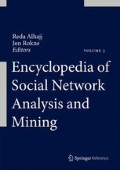Access this chapter
Tax calculation will be finalised at checkout
Purchases are for personal use only
References
Agarwal A, Xie B, Vovsha I, Rambow O, Passonneau R (2011) Sentiment analysis of twitter data. In: Proceedings of the ACL 2011 workshop on languages in social media, Portland, pp 30–38
Aue A, Gamon M (2005) Customizing sentiment classifiers to new domains: a case study. In: Proceedings of recent advances in natural language processing (RANLP), Borovets
Barbosa L, Feng J (2010) Robust sentiment detection on twitter from biased and noisy data. In: Proceedings of COLING, Beijing, pp 36–44
Blitzer J, Dredze M, Pereira F (2007) Biographies, bollywood, boom-boxes and blenders: domain adaptation for sentiment classification. In: Proceedings of the Association for Computational Linguistics (ACL), Prague, pp 440–447
Boiy E, Hens P, Deschacht K, Moens M (2007) Automatic sentiment analysis in on-line text. In: Proceedings of the 11th international conference on electronic publishing, Vienna pp 349–360
Calais Guerra P, Veloso A, Meira W Jr, Almeida V (2011) From bias to opinion: a transfer-learning approach to real-time sentiment analysis. In: Proceedings of the 17th ACM SIGKDD international conference on knowledge discovery and data mining, San Diego, pp 150–158
Go A, Bhayani R, Huang L (2009) Twitter sentiment classification using distant supervision. CS224N Project Report, Stanford
Kouloumpis E, Wilson T, Moore J (2011) Twitter sentiment analysis: the good the bad and the omg! In: Proceedings of the ICWSM, Barcelona
Lewis D (1998) Naive (bayes) at forty: the independence assumption in information retrieval. In: Machine learning: ECML-98, Chemnitz. Springer, pp 4–15
Lin C, He Y (2009) Joint sentiment/topic model for sentiment analysis. In: The 18th ACM conference on information and knowledge management (CIKM), Hong Kong
Matsumoto S, Takamura H, Okumura M (2005) Sentiment classification using word sub-sequences and dependency sub-trees. In: Proceedings of the Pacific-Asia conference on knowledge discovery and data mining (PAKDD), Hanoi. Springer, pp 301–310
McDonald R, Hannan K, Neylon T, Wells M, Reynar J (2007) Structured models for fine-to-coarse sentiment analysis. In: Proceedings of the annual meeting of the Association of Computational Linguistics (ACL), Prague, pp 432–439
Pak A, Paroubek P (2010) Twitter as a corpus for sentiment analysis and opinion mining. In: Proceedings of LREC, Malta
Pang B, Lee L (2004) A sentimental education: sentiment analysis using subjectivity summarization based on minimum cuts. In: Proceedings of the 42nd annual meeting on Association for Computational Linguistics, Barcelona. Association for Computational Linguistics, p 271
Pang B, Lee L, Vaithyanathan S (2002) Thumbs up?: sentiment classification using machine learning techniques. In: Proceedings of the conference on empirical methods in natural language processing, Philadelphia, vol 10. Association for Computational Linguistics, pp 79–86
Qiu L, Zhang W, Hu C, Zhao K (2009) SELC: a self-supervised model for sentiment classification. In: Proceeding of the 18th ACM conference on information and knowledge management (CIKM), Hong Kong, pp 929–936
Read J, Carroll J (2009) Weakly supervised techniques for domain-independent sentiment classification. In: Proceeding of the 1st international CIKM workshop on topic-sentiment analysis for mass opinion, Hong Kong, pp 45–52
Speriosu M, Sudan N, Upadhyay S, Baldridge J (2011) Twitter polarity classification with label propagation over lexical links and the follower graph. In: Proceedings of the EMNLP 2011, conference on empirical methods in natural language processing, Edinburgh, pp 53–63
Tan C, Lee L, Tang J, Jiang L, Zhou M, Li P (2011) User-level sentiment analysis incorporating social networks. In: Proceedings of the 17th ACM SIGKDD international conference on knowledge discovery and data mining, San Diego
Turney P (2002) Thumbs up or thumbs down? Semantic orientation applied to unsupervised classification of reviews. In: Proceedings of the 40th annual meeting of the Association for Computational Linguistics (ACL'02), Philadelphia
Turney PD, Littman ML (2002) Unsupervised learning of semantic orientation from a hundred-billion-word corpus. ArXiv Computer Science e-prints cs.LG/0212012
Whitelaw C, Garg N, Argamon S (2005) Using appraisal groups for sentiment analysis. In: Proceedings of the ACM international conference on information and knowledge management (CIKM), Bremen, pp 625–631. doi:http://doi.acm.org/10.1145/1099554.1099714
Zagibalov T, Carroll J (2008a) Automatic seed word selection for unsupervised sentiment classification of Chinese text. In: Proceedings of the 22nd international conference on computational linguistics (COLING), Manchester, pp 1073–1080
Zagibalov T, Carroll J (2008b) Unsupervised classification of sentiment and objectivity in Chinese text. In: Proceedings of the third international joint conference on natural language processing, Hyderabad, pp 304–311
Zaidan O, Eisner J, Piatko C (2007) Using annotator rationales to improve machine learning for text categorization. In: Proceedings of NAACL-HLT, Rochester, pp 260–267
Author information
Authors and Affiliations
Editor information
Editors and Affiliations
Rights and permissions
Copyright information
© 2014 Springer Science+Business Media New York
About this entry
Cite this entry
Lin, C., He, Y. (2014). Sentiment Analysis in Social Media. In: Alhajj, R., Rokne, J. (eds) Encyclopedia of Social Network Analysis and Mining. Springer, New York, NY. https://doi.org/10.1007/978-1-4614-6170-8_120
Download citation
DOI: https://doi.org/10.1007/978-1-4614-6170-8_120
Published:
Publisher Name: Springer, New York, NY
Print ISBN: 978-1-4614-6169-2
Online ISBN: 978-1-4614-6170-8
eBook Packages: Computer ScienceReference Module Computer Science and Engineering

